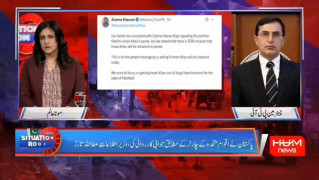Kamran Stu
MPA (400+ posts)
The Next Arab Uprising
The Collapse of Authoritarianism in the Middle East
Why Authoritarianism Is Collapsing in the Middle East
By Marwan Muasher

Two perfect storms have struck the Arab world in the past decade. In 2011, in what was at first optimistically called “the Arab Spring,” popular uprisings unseated autocrats across the region. Hopes ran high that these peaceful protest movements would usher in a new era of democracy in the Middle East. But except in Tunisia, they ended in turmoil or deadly civil wars. Then, in 2014, the region’s leaders were dealt another blow when the price of oil plummeted, threatening the basic model of governance on which their power rested. Low oil prices since have made it difficult for regimes to fund bloated budgets, buy off elites, and hold up long-postponed reforms. This is not a temporary aberration: it is unlikely that the price of oil will ever again rise to its pre-2014 levels.
On the surface, many Arab states appear to have weathered these two storms—however shakily. But there is more turbulence ahead. The shocks of 2011 and 2014 were just the first symptoms of a deeper transformation under way in the region: the fundamental bargain underpinning stability in Middle Eastern states is coming undone, and unless regional leaders move quickly to strike new bargains with their citizens, even larger storms will come.
Stay informed.
In-depth analysis delivered weekly. For more than half a century, Middle Eastern governments have used oil wealth to fund a system of economic patronage. Known as “rentier states,” these governments derive a substantial portion of their revenue from selling off national resources or bargaining for foreign backing rather than extracting taxes from citizens. In some countries, such as Saudi Arabia and the United Arab Emirates (UAE), the revenue has come from the sale of domestic oil resources; in others, such as Egypt and Jordan, they have come in the form of transfers from regional patrons with oil wealth.
Throughout the Middle East, governments have used oil resources to fund stable jobs, education, and health care, and in return, leaders have received political submission. But as oil prices have remained low and the region’
Source
The Collapse of Authoritarianism in the Middle East
Why Authoritarianism Is Collapsing in the Middle East
By Marwan Muasher

Two perfect storms have struck the Arab world in the past decade. In 2011, in what was at first optimistically called “the Arab Spring,” popular uprisings unseated autocrats across the region. Hopes ran high that these peaceful protest movements would usher in a new era of democracy in the Middle East. But except in Tunisia, they ended in turmoil or deadly civil wars. Then, in 2014, the region’s leaders were dealt another blow when the price of oil plummeted, threatening the basic model of governance on which their power rested. Low oil prices since have made it difficult for regimes to fund bloated budgets, buy off elites, and hold up long-postponed reforms. This is not a temporary aberration: it is unlikely that the price of oil will ever again rise to its pre-2014 levels.
On the surface, many Arab states appear to have weathered these two storms—however shakily. But there is more turbulence ahead. The shocks of 2011 and 2014 were just the first symptoms of a deeper transformation under way in the region: the fundamental bargain underpinning stability in Middle Eastern states is coming undone, and unless regional leaders move quickly to strike new bargains with their citizens, even larger storms will come.
Stay informed.
In-depth analysis delivered weekly. For more than half a century, Middle Eastern governments have used oil wealth to fund a system of economic patronage. Known as “rentier states,” these governments derive a substantial portion of their revenue from selling off national resources or bargaining for foreign backing rather than extracting taxes from citizens. In some countries, such as Saudi Arabia and the United Arab Emirates (UAE), the revenue has come from the sale of domestic oil resources; in others, such as Egypt and Jordan, they have come in the form of transfers from regional patrons with oil wealth.
Throughout the Middle East, governments have used oil resources to fund stable jobs, education, and health care, and in return, leaders have received political submission. But as oil prices have remained low and the region’
Source
Last edited by a moderator:




























